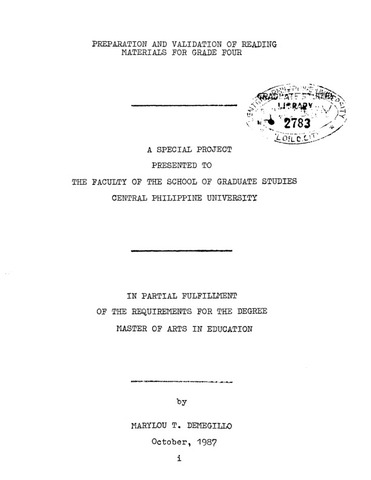Preparation and validation of reading materials for grade four

Page views
466Дата
1987Автор
Thesis Adviser
Defense Panel Chair
Defense Panel Member
Share
Metadata
Показать полную информацию
Аннотации
Reading is a necessary tool for learning the different subjects in the curriculum. Unless a child learns to read, he will never succeed in performing tasks assigned to him in school. The ability to read is a skill important in leading a successful life.
Learning to read is a process which goes on at several levels and continues over many years. Experts in reading have enumerated these stages as follows: (1) initial reading readiness, (2) initial instruction, (3) rapid growth, (4) increasing efficiency and range and (5) refinement. Children have to pass through these stages as they gradually progress toward the level where they can read efficiently and easily. In the process of developing the child’s growth in reading, the kind of books or any reading material given him is of utmost importance.
Teachers play an important role in selecting the kind of reading material that appeal to their children. They should guide their children in choosing the appropriate material because careful guidance in the choice of reading matter is very important in the development of desirable habits and attitudes. When a child has an early pleasant experience in books or any reading material, he will most likely develop a positive attitude and persistent enthusiasm for reading.
In the public school, a teacher is guided by a list of reading skills to be developed to children from K (Kindergarten to Grade VI) as reflected in the Elementary Learning Continuum. These reading skills which are arranged sequentially include word recognition, comprehension, oral reading skills, study skills and literary-appreciation skills.
Before the teacher introduces these skills, she must achieve some understanding of the nature and needs of every boy and girl in her class. She must understand that there are several factors which influence the extent of the reading ability acquired. These factors as Villamin pointed out are: intelligence, motivation, interest, home background, physical, social and emotional aspects. Among these factors, interest is one of the most important. It arouses the child’s curiosity and desire for reading. When the reading material is interesting, the child tends to concentrate on the tale of the idea rather than on a printed page. Thus as he reads, he not only learns to grasp meaning but also learns to derive pleasure from reading.
Interest in reading is hard to promote among pupils unless the material to be read is in itself interesting. The shortage of varied materials which are interesting to children has always been a problem. Teachers cannot secure immediately ready-made materials which are appropriate to the reading level and experiential background of the pupils.
This is the reason why MECSRO-VI grantees have conducted a project on the preparation and validation of multi-level reading materials. The researcher, being one of the grantees, prepared materials with the hope that these materials be of use and help to pupils and teachers of Victorias District II.
Statement of the Problem
This study aims to prepare and validate reading materials for pupils in Grade IV based on their reading interest and reading level. This study further aims to answer the following questions:
1) What kind of stories are interesting to Grade IV pupils?
2) Are the reading materials readable and valid for the grade they are designed?
3) Are the test exercises that accompany each selection valid and reliable?
Описание
Introduction and statement of the problem
Suggested Citation
Demegillo, M. T. (1987). Preparation and validation of reading materials for grade four (Unpublished Master’s special paper). Central Philippine University, Jaro, Iloilo City.
Type
Special paperТематика
Department
School of Graduate StudiesDegree
Master of Arts in Education with specialization in Reading (English)Shelf Location
GSL Theses 378. 242 D393 1987
Physical Description
233 leaves

